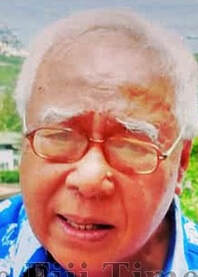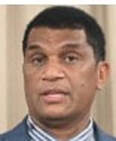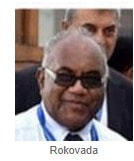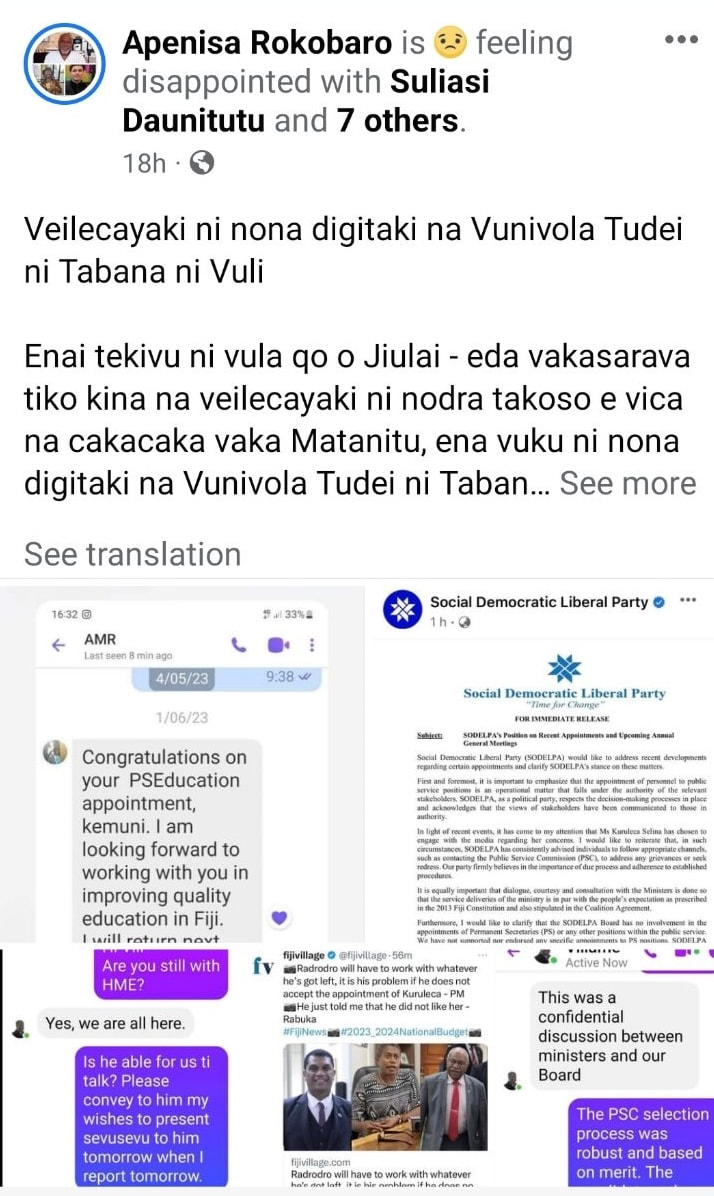"Hope you understand _______ the Minister for Education is a different type of person to deal with and the composition of and conditions for the People's Coalition Government makes it even more difficult to manage him. Perhaps you could offer your ______ skills to try to address the intransigent Minister." Luke Rokovada
Coming Soon: RFMF alarmed that KURULECA might compromise national security, for as newly appointed PS, on appointment as a Civil Servant, she LEAKED her Private Viber messages with Radrodro to her Australian supporters to post them all over social media
Fijileaks: Perhaps Kuruleca may be of better use to the Health Ministry, but not at PS level as that will set the qualified medical doctors (and may be nurses too who have their own union) working in Health on a path of frustration and resistance.
*The fact that she is Director of Kuruleca Consultants, is not equivalent administratively in any way at all to the very large Ministry of Education, nor to schools.
*Any person in Fiji can register a consultancy.
*She has a Masters in Counselling and Psychology from Santa Clara University (a private Jesuit university), in Santa Clara, California. Emphasis in Health Psychology and trained as a marriage and family therapist.
Graduated in 2003, Ms Kuruleca returned to Fiji and joined the Department of Psychology, University of the South Pacific, before venturing into full time private practice in 2006.
*Meanwhile, ROKOVADA also lied that he had on-going discussions with Radrodro when the Education Minister told a press conference that he was never informed of SELINA KURULECA'S appointment as his new Permanent Secretary
"Thank you ______for your thoughts and views on the appointment of Selina Kuruleca as PS Education. Consultation with Minister for Education was ongoing throughout the process and still ongoing now. The Commission interviewed more than ten shortlisted candidates for the position of PS Education. The usual number of shortlisted candidates for interview for the PS positions ranged from 4 - 8 depending on the number of well qualified applicants. All five (5) PSC Commissioners conducted the interviews and the KPMG senior partner's role was to introduce the shortlisted candidates and thank them for participating in the interview process at the end.
Hope you understand _______ the Minister for Education is a different type of person to deal with and the composition of and conditions for the People's Coalition Government makes it even more difficult to manage him. Perhaps you could offer your ______ skills to try to address the intransigent Minister."
SWEET [KAMIKAMICA] REWARDS: While Manoa Kamikamica and Biman Prasad were allowed to retain their PS' from the FFP government era, Radrodro was not extended the same opportunity or even asked if he wanted to keep the old PS Education. Rabuka and Rokovada, indulging in constitutional gymnastics, dumped Kuruleca on Radrodro and the teachers unions in Fiji.
*The former veteran permanent secretary JIOJI KOTOBALAVU agrees with our initial argument that RADRODRO should have been consulted on Kuruleca's appointment.

APPOINTMENT OF PERMANENT SECRETARIES TO GOVERNMENT MINISTRIES SHOULD A MINISTER BE CONSULTED BEFORE HIS OR HER MINISTRY's PERMANENT SECRETARY IS APPOINTED?
By Jioji Kotobalavu
According to media reports, the Minister for Education, Aseri Radrodro, is not happy with the Permanent Secretary recently appointed by the Public Service Commission to serve in his ministry. The officer concerned, Ms Selina Kuruleca, has confirmed that she has signed with the PSC her contract of service.
She has also publicly said that she is ready to serve in this capacity.
Commenting on this appointment, the chairperson of the Public Service Commission, Luke Rokovada, and the Prime Minister, Sitiveni Rabuka, the two constitutional authorities for the appointment of permanent secretaries have asserted that Ms Kuruleca's appointment was made fully in accordance with the law.
Section 126-(1)(a) of the 2013 Constitution empowers the PSC to appoint permanent secretaries, with the agreement of the Prime Minister.
So, both the PSC chairperson and the Prime Minister have acted correctly in accordance with their constitutional powers. However, in order to ensure that what has happened in this particular case does not recur in future, it is important to look at the procedures for appointing permanent secretaries, from other pertinent perspectives.
Considering this issue from the perspective of administrative justice and employment law, the question that arises is: in the appointment of permanent secretatiries to Government Ministries, should there be an informal and good faith procedural requirement that before the PSC makes a decision in exercise of its powers under section 126-(1)(a) of the 2013 Constitution, the Minister in the Ministry involved should be first consulted either by the Prime Minister. or by the chairpersion of the PSC with prior clearance from the Prime Minister.
The public purpose to be served by this procedural requirement for prior consultation with the Minister is to ensure that the two; ie, the Minister and the Permanent Secretary can work together in mutual confidence and trust.
This is very important because in managing a ministry and its departments the permanent secretary does not act alone. In fact, consider the following provisions from the 2013 Constitution:
*Section 127-(3 ): The permanent secretary of a ministry is responsible to the Minister concerned for the efficient, effective, and economical management of the ministry or any department under the ministry
*Section 127-(7): The permanent ministry shall have the authority to appoint, remove and institute disciplinary action against all staff of the ministry, with the agreement of the Minister responsible for the ministry
*Section 127-(8): The permanent secretary of each ministry, with the agreement of the Minister responsible for the ministry, has the authority to determine all matters pertaining to the employment of all
staff in the ministry, including...
One can clearly see from these provisions the crucial importance of enabling a smooth and effective working relationship between the Minister and the permanent secretary based on, in employment law parlance, mutual confidence and trust.
In administrative law, the courts have always emphasised in relation to section 16 of the 2013 Constitution-on Executive and administrative justice- the importance of public authorities exercising their statutory powers in good faith and in adopting procedures that are procedurally fair to those that are directly affected by the exercise of a statutory power.
Clearly, the PSC should consider these administrative justice and fair employment practises when making appointments of permanent secretaries to Government Ministries.
This is especially in light of the provisions of the 2013 Constitution under section 127 empowering the Minister with a role in the management of the ministry's and its associated departments' staff and budget.
From my own experience as a permanent secretary, what has happened on this issue underscores the importance of the PSC and senior management staff in the civil service and other public service agencies of the state investing time in educating themselves on the principles of administrative law and employment law
Jioji Kotobalavu is a former permanent secretary in the Fiji civil service and currently lectures in public
law and in international relations and diplomacy at the University of Fiji's JDP School of Law. The views
he expresses are his own and are not necessarily shared by this newspaper
By Jioji Kotobalavu
According to media reports, the Minister for Education, Aseri Radrodro, is not happy with the Permanent Secretary recently appointed by the Public Service Commission to serve in his ministry. The officer concerned, Ms Selina Kuruleca, has confirmed that she has signed with the PSC her contract of service.
She has also publicly said that she is ready to serve in this capacity.
Commenting on this appointment, the chairperson of the Public Service Commission, Luke Rokovada, and the Prime Minister, Sitiveni Rabuka, the two constitutional authorities for the appointment of permanent secretaries have asserted that Ms Kuruleca's appointment was made fully in accordance with the law.
Section 126-(1)(a) of the 2013 Constitution empowers the PSC to appoint permanent secretaries, with the agreement of the Prime Minister.
So, both the PSC chairperson and the Prime Minister have acted correctly in accordance with their constitutional powers. However, in order to ensure that what has happened in this particular case does not recur in future, it is important to look at the procedures for appointing permanent secretaries, from other pertinent perspectives.
Considering this issue from the perspective of administrative justice and employment law, the question that arises is: in the appointment of permanent secretatiries to Government Ministries, should there be an informal and good faith procedural requirement that before the PSC makes a decision in exercise of its powers under section 126-(1)(a) of the 2013 Constitution, the Minister in the Ministry involved should be first consulted either by the Prime Minister. or by the chairpersion of the PSC with prior clearance from the Prime Minister.
The public purpose to be served by this procedural requirement for prior consultation with the Minister is to ensure that the two; ie, the Minister and the Permanent Secretary can work together in mutual confidence and trust.
This is very important because in managing a ministry and its departments the permanent secretary does not act alone. In fact, consider the following provisions from the 2013 Constitution:
*Section 127-(3 ): The permanent secretary of a ministry is responsible to the Minister concerned for the efficient, effective, and economical management of the ministry or any department under the ministry
*Section 127-(7): The permanent ministry shall have the authority to appoint, remove and institute disciplinary action against all staff of the ministry, with the agreement of the Minister responsible for the ministry
*Section 127-(8): The permanent secretary of each ministry, with the agreement of the Minister responsible for the ministry, has the authority to determine all matters pertaining to the employment of all
staff in the ministry, including...
One can clearly see from these provisions the crucial importance of enabling a smooth and effective working relationship between the Minister and the permanent secretary based on, in employment law parlance, mutual confidence and trust.
In administrative law, the courts have always emphasised in relation to section 16 of the 2013 Constitution-on Executive and administrative justice- the importance of public authorities exercising their statutory powers in good faith and in adopting procedures that are procedurally fair to those that are directly affected by the exercise of a statutory power.
Clearly, the PSC should consider these administrative justice and fair employment practises when making appointments of permanent secretaries to Government Ministries.
This is especially in light of the provisions of the 2013 Constitution under section 127 empowering the Minister with a role in the management of the ministry's and its associated departments' staff and budget.
From my own experience as a permanent secretary, what has happened on this issue underscores the importance of the PSC and senior management staff in the civil service and other public service agencies of the state investing time in educating themselves on the principles of administrative law and employment law
Jioji Kotobalavu is a former permanent secretary in the Fiji civil service and currently lectures in public
law and in international relations and diplomacy at the University of Fiji's JDP School of Law. The views
he expresses are his own and are not necessarily shared by this newspaper







